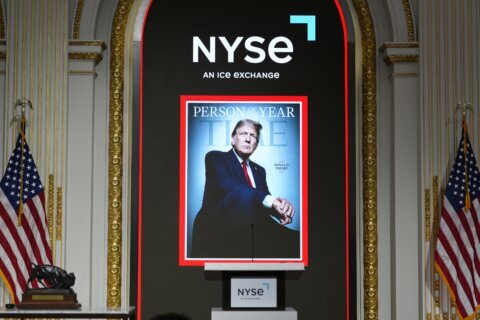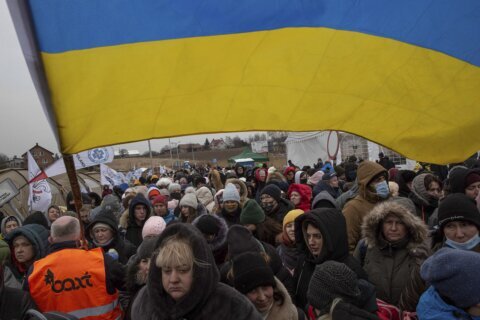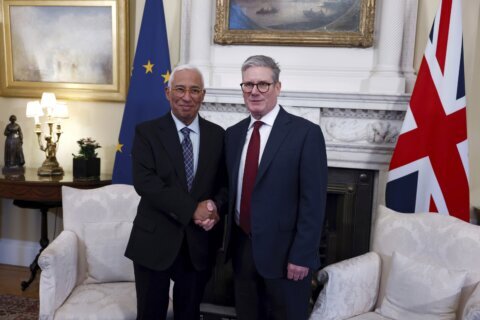SEOUL, South Korea (AP) — President Vladimir Putin is in North Korea for a summit with its leader, Kim Jong Un, as the two nations deepen their cooperation.
The visit comes amid growing concerns about an arrangement in which Pyongyang provides Moscow with badly needed munitions to fuel Russia’s war in Ukraine in exchange for economic assistance and technology to enhance the threat posed by Kim’s nuclear weapons and missile program.
Despite their often aligning interests, relations between Russia and North Korea have experienced highs and lows. Some key events:
1945-1948 — Japan’s colonial rule of the Korean Peninsula ends with Tokyo’s World War II defeat in 1945 but the peninsula is eventually divided into a Soviet-backed north and a U.S.-backed south. The Soviet military installs future dictator Kim Il Sung, a former guerrilla leader who fought Japanese forces in Manchuria, into power in the North.
1950-1953 — Kim Il Sung’s forces launch a surprise attack on the South in June 1950, triggering the Korean War. The conflict brought in forces from the newly created People’s Republic of China, aided by the Soviet air force. Troops from South Korea, the United States and other countries under the direction of the United Nations battle to repulse the invasion. A 1953 armistice stops the fighting and leaves the Korean Peninsula in a technical state of war.
Mid-1950s though 1960s — The Soviet Union continues to provide economic and military assistance to North Korea, but their relations decline as Kim Il Sung violently purges pro-Soviet and pro-Chinese factions within the North’s leadership to consolidate his power. Moscow reduces its aid but does not cut it off until the end of the Cold War.
1970s — As a rivalry between the Soviet Union and China intensifies, North Korea pursues an “equidistance” policy that allows it to play the mutually hostile communist giants against each other to extract more aid from both. Pyongyang also tries to reduce its dependency on Moscow and Beijing, but a series of policy failures following heavy borrowing from international financial markets push North Korea’s economy into decades of disarray.
1980s — Following Mikhail Gorbachev’s rise to power, the Soviet Union begins to reduce aid to North Korea and to favor reconciliation with South Korea. Seoul also expands diplomatic relations with communist countries in Eastern Europe, leaving Pyongyang increasingly isolated.
1990s — The 1991 collapse of the Soviet Union deprives North Korea of its main economic and security benefactor. The post-communist government in Moscow led by President Boris Yeltsin shows no enthusiasm for supporting North Korea with continued aid and subsidized trade. Moscow establishes formal diplomatic ties with Seoul in hopes of drawing South Korean investment and allows its Soviet-era military alliance with North Korea to expire. Kim Il Sung dies in 1994, and North Korea experiences a devastating famine later in the 1990s. The number of deaths is estimated in the hundreds of thousands.
Early 2000s — After his first election as president in 2000, Vladimir Putin actively seeks to restore Russia’s ties with North Korea. Putin visits Pyongyang in July of that year to meet with Kim Jong Il, the second-generation North Korean leader. The two issue joint criticism of U.S. missile defense plans. The trip is seen as Russia’s statement that it would work to restore its traditional domains of influence as the divergence between Moscow and the West over key security issues grows. Putin hosts Kim Jong Il for subsequent meetings in Russia in 2001 and 2002.
Mid-to-late 2000s — Despite warmer relations, Russia twice supports U.N. Security Council sanctions against North Korea over what was then a nascent nuclear weapons and missile program. Russia participates in talks aimed at persuading the North to abandon its nuclear program in exchange for security and economic benefits. The talks, which also involved the U.S., China, South Korea and Japan, collapse in December 2008.
2011-2012 — Months after a summit with then-Russian President Dmitry Medvedev in August 2011, Kim Jong Il dies and is succeeded by his son, Kim Jong Un. In 2012, Russia agrees to write off 90% of North Korea’s estimated $11 billion debt.
2016-2017 — Kim Jong Un accelerates the North’s nuclear and missile tests. Russia supports stringent Security Council sanctions that include limiting oil supplies and cracking down on the country’s labor exports.
2018-2019 — Kim Jong Un initiates diplomacy with Washington and Seoul to leverage his nuclear program for economic benefits. He also tries to improve ties with traditional allies China and Russia to boost his bargaining power. After his second meeting with U.S. President Donald Trump breaks down over U.S.-led sanctions on the North, Kim Jong Un travels to the eastern Russian city of Vladivostok for his first summit with Putin in April 2019. The leaders vow to expand cooperation, but the meeting doesn’t produce substantial results.
2022 — While using the distraction caused by Russia’s war on Ukraine to further ramp up its weapons tests, North Korea blames the United States for the conflict. Pyongyang claims the West’s “hegemonic policy” gave Putin justification to defend Russia by sending troops into the neighboring country. North Korea joins Russia and Syria in recognizing the independence of two Moscow-backed separatist regions of eastern Ukraine. Russia and China block U.S.-led efforts at the Security Council to strengthen sanctions on North Korea over its intensifying missile tests.
Sept. 12, 2023 — Kim Jong Un meets Putin in Russia’s Far East, their first summit since 2019. U.S. and South Korean officials say military, economic and other exchanges between North Korea and Russia have sharply increased since then. Washington and Seoul accuse the North of providing Russia with artillery, missiles and other military equipment to help its war in Ukraine, possibly in return for key military technologies and aid. Both Pyongyang and Moscow deny accusations about North Korean weapons transfers. Oct. 18, 2023 – Russian Foreign Minister Sergey Lavrov visits North Korea, where he thanks Pyongyang for its “unwavering” support for Moscow’s action in Ukraine. He later meets with Kim Jong Un and proposes regular three-way security talks involving China to deal with what he described as increasing U.S.-led regional military threats.
Jan. 16, 2024 – North Korean Foreign Minister Choe Son Hui meets Putin and Lavrov in Moscow for unspecified discussions implementing the agreements reached during the Putin-Kim summit. Putin reaffirms his desire to visit the North.
March 28, 2024 — Russia vetoes a U.N. Security Council resolution, ending monitoring of U.N. sanctions against North Korea over its nuclear program. The move prompts Western accusations that Moscow is seeking to avoid scrutiny as it buys weapons from Pyongyang for use in Ukraine.
June 19, 2024 — Putin arrives in Pyongyang, North Korea.
___
Associated Press journalist Jim Heintz in Tallinn, Estonia, contributed.
___
Follow AP’s coverage at https://apnews.com/hub/russia-ukraine
Copyright © 2024 The Associated Press. All rights reserved. This material may not be published, broadcast, written or redistributed.







